According to the Canadian Digestive Health Foundation, over 20 million Canadians experience uncomfortable and sometimes downright debilitating digestive system problems each year. Symptoms can manifest in the form of bloating, constipation, nausea, diarrhea, excess gas, cramping, and/or pain in the abdomen. When multiple symptoms present themselves at once, it may be a sign of something more serious, like Irritable Bowel Syndrome (IBS), Leaky Gut Syndrome, or SIBO. Below, I’ll discuss ten “gut superfoods” proven to improve the microflora in your intestines. I’ll also show you seven ways to maximize these holistic nutrition foods with actionable tips to accelerate your recovery.
10 FOODS TO NOURISH AND RESTORE YOUR GUT MICROBIOME
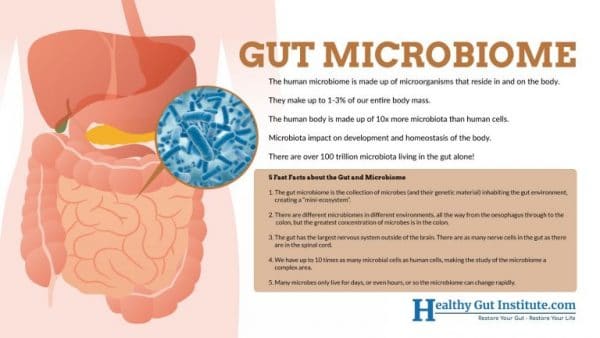
Trillions of microbes live inside your large intestine. These include bacteria, fungi, viruses, and various other living organisms. Many of them are healthy and beneficial, and they help you feel strong and energetic while simultaneously protecting you from illness and fatigue. Although a small proportion of bacteria in the gut is harmful, the vast majority is “good.” In other words, the purpose of most gut bacterial strains is to support your immune system, nervous system, and mental health, as well as shield you against the threat of serious infections and diseases. Another benefit, of course, is improved digestive system health and a reduction in symptoms like bloating and constipation. When you incorporate the following ten foods into your diet, you will be one step closer to having a healthier gut microbiome!
1. Yogurt
Yogurt is essentially a thickened form of fermented milk. It contains organisms called probiotics, which are live strains of healthy bacteria that mimic the “good” bacteria already existing inside of your gut. When you eat probiotic-rich foods like yogurt, you’re adding more healthy bacteria to your gut, thus encouraging more healthy bacteria to flourish.
Probiotics are necessary for a strong immune system, proper nutrient absorption, and sufficient energy throughout the day. A diet lacking in probiotics could leave you more prone to developing H. Pylori Infection, chronic high blood pressure, eczema, hepatic encephalopathy, and food allergies.
2. Garlic
Garlic has been lauded for its medicinal properties for thousands of years, garnishing respect from ancient Egyptian, Roman, Greek, and Chinese civilizations. Researchers suggest that garlic fights chronic fatigue naturally, diminishes your likelihood of catching a cold, and lowers “bad” cholesterol.
When it comes to healing your digestive system, garlic yet again makes perfect sense because it contains prebiotics. Prebiotics are a type of non-digestible that feed the healthy bacteria already living in the gut.
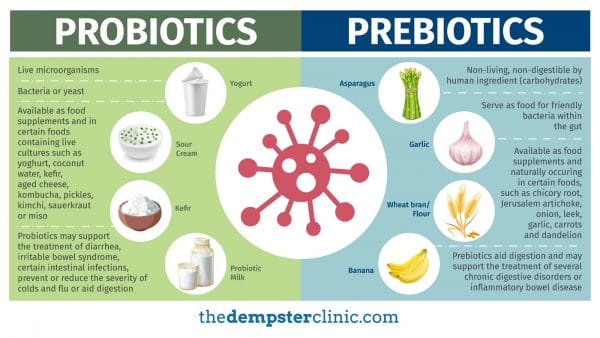
3. Sauerkraut
Sauerkraut is fermented cabbage, and it is a rich source of probiotics. In addition to its gut-healing “good” bacteria, sauerkraut is an excellent plant-based source of protein, iron, and fiber. As published in the Journal of Applied and Environmental Microbiology, one half cup of sauerkraut contains roughly 28 prominent strains of healthy bacteria. It’s best for your gut microbiome to receive a wide variety of bacterial strains, so eating sauerkraut is an especially effective food for diversifying and strengthening the gut microbiome.
Furthermore, sauerkraut has a multitude of enzymes that effectively break down its own protein, iron, and fiber into smaller pieces. As a result, your body is better able to absorb these nutrients and reap maximum nutrition benefits.
Other examples of probiotic-rich fermented foods include Tempeh, Miso, and Kombucha.
4. Ginger
In addition to being a long-respected natural cure for nausea and morning sickness, eating ginger accelerates the passage of food through your small and large intestines. This helps soothe discomfort related to sluggish digestion and may relieve symptoms like cramps, bloating, and constipation.
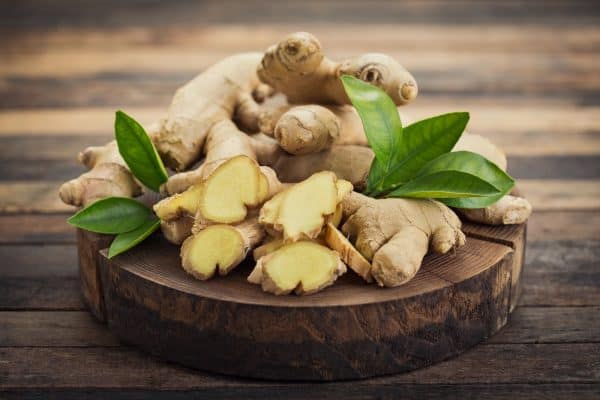
5. Bone Broth
In addition to its anti-aging properties, bone broth has healing benefits for your gut. In fact, bone broth is one of the most nutrient-dense foods available. Perhaps that is why its nickname, “nature’s multivitamin,” is so apt.
However, even though bone broth is an excellent source of protein, the biggest health benefit it has to offer is a more robust digestive tract. This is largely due to the collagen within the bone broth. Collagen is a protein that forms the inner lining of the digestive tract, and it serves an incredibly important function: to keep small holes from forming along the inner wall of the intestines.
If left exposed, these holes permit food particles and chemicals to leak out of the intestines and into the bloodstream, possibly leading to Leaky Gut Syndrome. (If you suspect that you’re having symptoms of Leaky Gut, don’t hesitate to schedule an Intestine Permeability Assessment today!)
Given the function of collagen in maintaining a strong gastrointestinal lining, it only seems natural that making sure to eat sufficient collagen will help reduce the risk of developing Leaky Gut Syndrome, IBS, Crohn’s Disease, and acid reflux.
Another benefit of collagen is that it naturally creates more gelatin within your body. This soft, thick matter makes it easier for your body to digest gluten and lactose. If you aren’t familiar with these terms, lactose and gluten are two of the most common food sensitivities. Furthermore, the gelatin found in bone broth contains vital amino acids that promote a healthy probiotic balance within the gut microbiome.
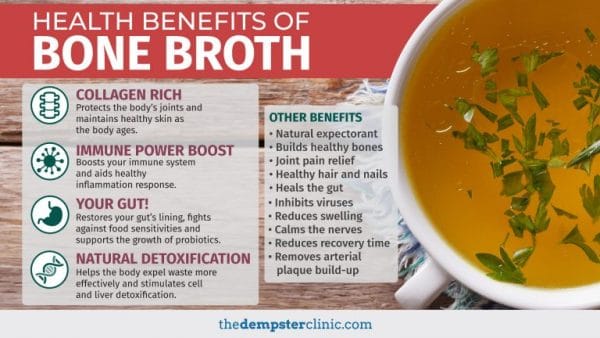
6. Kefir
Put simply, Kefir is fermented milk. People make it by adding a mixture of bacteria and yeast to milk. It is typically made from fermented cow’s milk, but it can also be fermented from coconut water, coconut milk, goat’s milk, and rice milk. Kefir tastes a lot like yogurt, and it shares a lot of the same nutrients. These include probiotics, certain B Vitamins, protein, potassium, and calcium. However, Kefir has a higher concentration of fat, protein, and nutritional yeast. And, in comparison with yogurt, Kefir is full of a much wider variety of live bacterial strains.
Kefir is particularly helpful for assisting in the digestion of lactose, and consuming Kefir is associated with less digestive system discomfort in lactose-intolerant individuals. Numerous researchers have published clinical studies with the same conclusion: consuming kefir decreases unhealthy gut bacteria while instantaneously causing healthy bacterial strains to multiply. Yet another exciting finding is that kefir calms inflammation with the gut, leading to smoother digestive system processes.
According to a study published in the Journal of Alimentary Pharmacology & Therapeutics, individuals suffering from bloating and constipation experienced relief after ingesting fermented milk for six weeks.
7. Apples
Apples are valuable sources of anti-aging, disease-preventing antioxidants. They also contain a fair amount of dietary fiber and Vitamin C per serving. But the profile of these popular fruits keeps getting better: apples also have a low glycemic index rating, meaning that they won’t cause undue rises in blood sugar and are considered safe for individuals with diabetes.

In addition to this already-robust nutrition profile, apples contain a special type of soluble fiber called pectin. Unlike most food substances, this healthy soluble fiber skips the small intestine. Instead, it travels along to the colon, where it is finally broken down into smaller particles by the colon’s naturally-existing “good” bacteria.
According to a report published in Nutrients, the pectin in apples is an effective remedy for both diarrhea and constipation. Even more, it helps safeguard the intestines and colon from infections and diseases.
8. Fennel
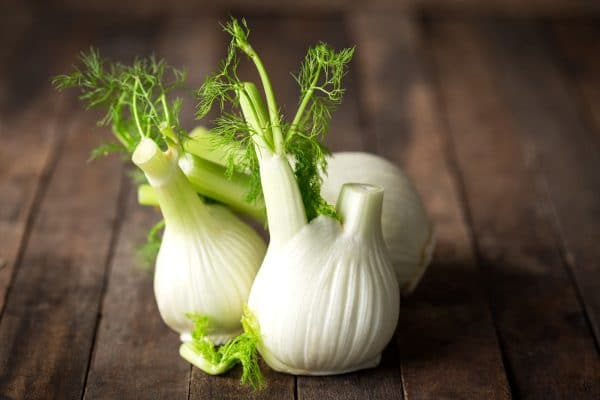
Fennel is a perennial herb belonging to the carrot family of vegetables. The most popular characteristic of fennel is its almost licorice flavour, and it is a popular way to make meals more flavourful. But, as is so often the case with medicinal herbs, fennel should not be reduced to a mere “extra.” Quite the opposite! Fennel is a small but mighty natural remedy for stomach discomfort, particularly for IBS-related symptoms.
According to researchers, there are two main reasons for the efficacy of fennel in treating digestive system discomfort. First, the dietary fiber and prebiotics found in fennel gently diminish symptoms of constipation while ameliorating homeostasis within the gut. Second, fennel relieves involuntary spasms of the muscles, thus stabilizing digestive tract muscle contractions. This calming effect helps banish bloating, cramping, and gas.
9. Papaya
This tropical, vibrantly coloured fruit is rather interesting because it contains a unique digestive enzyme, papain. Papain makes it easier for your body to break down protein and move food matter smoothly through the digestive system. It also soothes uncomfortable symptoms caused by IBS, including bloating, constipation, acid reflux, and diarrhea.
10. Whole Grains
“Whole grains” is a broad term referring to any type of grasslike plant that is grown by humans for consumption of its grain. Whole grains have kernels consisting of three parts: an endosperm, germ, and bran. (This is what sets them apart from refined grains.) Some examples of whole grains include barley, buckwheat, bulgar, brown rice, quinoa, oats, and oatmeal.
Whole grains alleviate digestive system distress via two mechanisms of action. First, the dietary fiber found in whole grains helps solidify loose stool and may also reduce constipation. The other beneficial characteristic of certain types of grains is their prebiotics, which act as fertilizers for the healthy bacteria in your gut. As the healthy bacterial strains flourish, the gut microbiome stabilizes and strengthens.
6 STRATEGIES TO BOOST THE HEALING EFFECTS OF GUT-HEALING “SUPERFOODS”
While I can’t stress enough how important it is to eat foods that are healthy for your gut, diet isn’t the only piece of the puzzle. Habits like daily exercise, mental self care, and taking supplements when necessary are additional strategies to remember as you work towards feeling your best. Just like knowing the best foods to eat to improve digestive system health, it’s equally important to be aware of the common foods that trigger digestive distress.
1. Avoid Excess Antibiotics
Avoid taking antibiotics unless absolutely necessary!
Instead of prescription medication, it is often better to allow yourself plenty of rest, drink plenty of fluids, and follow a holistic nutrition meal plan. Much of the time, your ailment will dissipate with time and proper care.

Since trillions of the bacterial strains in your gut are necessary for optimal health, it comes as no surprise that antibiotics interfere with the good bacteria just as they destroy the harmful strains. Because of this, it’s important to acknowledge that antibiotics can disrupt the gut micribiome’s delicate balance long after you finish taking treatment.
In fact, Researchers at Stanford discovered that study participants had certain gut bacteria that was still out of balance six months after antibiotic treatment. In an even more in-depth study, they concluded that using antibiotics may permanently change the state of an individual’s gut microbiome.
2. Monitor Stress
Stress worsens conditions like Leaky Gut Syndrome and IBS. Because of this, it’s essential that you regulate your stress levels. When you start feeling a bit too overwhelmed, engage in a calming activity to reign in those elevated cortisol levels.
Journaling, diffusing essential oils, meditating, meeting a friend for lunch, doing yoga, getting quality sleep, working with a trained therapist, staying active, and reducing the time you spend on your smartphone are all good ways to lower stress.
There is an undeniable link between mental stress and poor gut health, so don’t feel guilty about scheduling time for self-care!
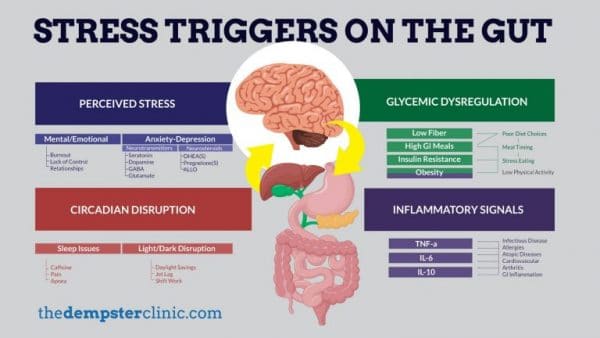
3. Get Tested for Underlying Food Sensitivities
Are you eating as many digestive system superfoods as possible and still experiencing symptoms? Is the food sensitivity elimination technique leaving you frustrated? It may be time to undergo allergy and sensitivity testing in order to determine the root cause of your pain.
4. Exercise
In addition to avoiding antibiotics and inflammatory foods, a key part of healing your gut is focusing on positive actions to help fortify your overall health and wellness. Exercise is a must for almost everyone, even someone living a pain-free life. Multiple studies reveal that consistent exercise can improve the health of your gut microbiome. For example, researchers at the University of Illinois found a correlation between a six week exercise program and a more robust gut microbiome.
5. Take Probiotic and Prebiotic Supplements
If you are unable to regularly fit probiotic- and prebiotic-rich foods into your diet, then consider supplements. These should not take the place of food, but they are a good adjunct therapy. Since probiotics are live strains of bacteria, they should be kept refrigerated at all times.
6. Avoid Foods Known to Trigger Sensitive Stomachs
If you’re experiencing symptoms like bloating, constipation, diarrhea, and similar digestive upsets, it’s time to avoid foods known for upsetting sensitive stomachs. For this reason, I recommend staying away from the following foods, at least until your chronic problems are resolved:
- Histamine-rich foods
- Refined carbohydrates and excess sugar
- Dairy products
- Carbonated drinks
- FODMAPs
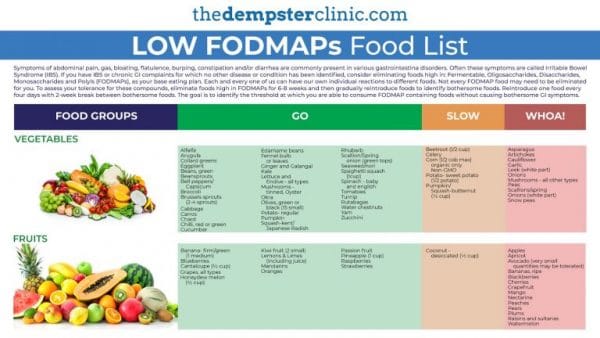
HEAL YOUR GUT AND FEEL YOUR BEST AT THE HEALTHY GUT INSTITUTE
Join my Healthy Gut Institute, a highly effective 6-week program. This expert training will enable you to overcome unrelenting gut health issues, and it’s appropriate for anyone who struggles with pain due to IBS, inflammatory bowel disease (IBD), colitis, SIBO, Crohn’s disease, Leaky Gut Syndrome, and other forms of gut disease. You will learn the single most important lifestyle factor for your health, the best essential oil for optimal gut health, the three best fermented foods for gut health, and how to HEAL and SEAL leaky gut permanently!
This is a guided, step-by-step course with guided modules to help you be pain-free in six weeks or less. The course includes:
- Over 50 educational videos to help you overcome the digestive system problems interfering with your life
- Access to the Healthy Gut Institute private Facebook Page Support Community and Live Question and Answer sessions
- Healthy Gut Institute Shopping List
- 10 BONUS interviews with the leading experts in gut health
- Over 70 downloadable worksheets and guides
- Comprehensive FODMAP foods list
- Gut health supplement guide
- 60 day money back guarantee
You can heal your gut health and live a pain-free life. Click here to enroll in the Healthy Gut Institute today!
Dr. John Dempster BSc., ND, FAAFM
The Dempster Clinic- Center for Functional Medicine


